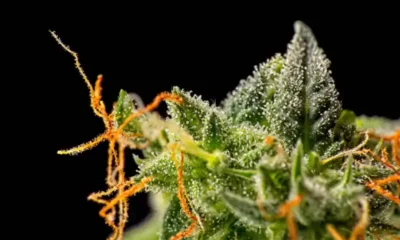Connect with us
Published
10 months agoon

The hemp market in the West and globally is booming, with myriad professionals and researchers teaming up to pinpoint what new, innovative ways hemp can serve humanity as a more sustainable material. While much of this progress seems like brand new territory, hemp has been used for numerous materials throughout history.
Now, one workshop in China is seeing a surge in popularity in its hemp shoes, a traditional garment that has become increasingly fashionable in overseas markets. The new frontier for hemp in a broader sense could spell big changes for legacy workers, such as Wang Xiaoxia in China’s Gansu Province.
According to a Big News Network report, Wang turns hemp fiber into twine using a traditional wooden tool to later be turned into hemp shoes. Hemp shoes are a traditional Chinese garment, dating back a thousand of years in Gangu County and in the city of Tianshui, Gansu Province. The traditional craft was also recognized as an item of intangible cultural heritage within the province in 2017.
“I inherited this tool from my mom. In the past, almost every household made and wore hemp shoes in our village,” Wang told the publication.
While hemp markets in the West and around the world are only just getting their footing, China is one of the first countries to cultivate hemp plants to create shoes. China has used hemp for a number of other purposes since ancient times, specifically to make ropes, shoes and hats, given its ability to absorb moisture and high durability.
Wang works at the Gansu Yaluren hemp handicraft development company, which participated in this year’s Canton Fair, otherwise known as the China Import and Export Fair. According to the event site, “The Canton Fair is the pinnacle of international trade events, boasting an impressive history and staggering scale. Exhibiting a vast array of products, it attracts buyers from all over the world and has generated immense business dealings in China.”
Gansu Yaluren Chairman Niu Junjun expressed his optimism about the future of the company’s hemp products overseas, stating, “In the first quarter of this year, we sold more than seven million yuan of hemp products. Many foreign trade dealers are interested in our products.”
Niu himself calls Ganu County home and grew up wearing locally made hemp shoes. While he was in college, he began to sell local products online through China’s e-commerce platform Taobao. He told Big News Network that hemp shoes were the most sought after product because of their “unique design and material.”
So, Niu took the momentum and ran with it. Back in 2011, he and his wife Guo Juan returned to Niu’s hometown with a focus on selling hemp shoes. At the same time, they sought to learn the intricacies of the old craft from scratch.
“The hemp shoes I wore when I was a child were comfortable enough, but the design was outdated. The key to success is more investment in developing new shoes and making innovations,” Niu said.
Today, Gansu Yaluren pools more than 300,000 yuan each year to develop new designs. Today, the company launched more than 180 different styles, and its hemp shoes specifically have taken off in non-Chinese markets.
The local government has also provided funding to the company, more than 1 million yuan each year, to support the vocational skills training of staff members and to help further develop relevant industries.
The company has also held free training courses since 2015 for local residents to cultivate a group of inheritors with knowledge on the ancient craft.
“We are in charge of providing local women with raw materials, the necessary techniques and orders for hemp products. It is a ‘one-stop’ service,” said Guo.
The rapid success story of Gansu Yaluren isn’t necessarily unusual given the world’s increasing interest toward hemp as an alternative material for a variety of products.
Late last year, a new project looking at the recyclability of hemp fibers for paper making, Hemp Recycles, received financial support from the Hemp Innovations Foundation. Additionally, denim brand Mava recently introduced its new hemp denim, an Irish nonprofit has teamed up with an English hemp farm to create tiny homes made from hemp, researchers have created a hemp alternative to steel rebar and even hemp-reliant batteries.


Despite City Efforts, Hemp Shops Posing as Dispensaries Prevail in Las Vegas


Cannabis Community, Investors React to DEA Decision To Reschedule


Georgia Governor Signs Bill Establishing Licensing Requirements To Grow Hemp


Study: Psilocybin Enhances Meditation


Ohio GOP Lawmakers Debate Adult-Use MJ Priorities, Eye June for Regulation Approval


Taylor Swift Puts Narcotics Into All of Her Songs on ‘The Tortured Poets Department’
